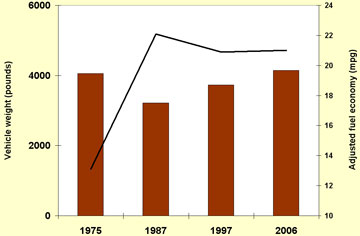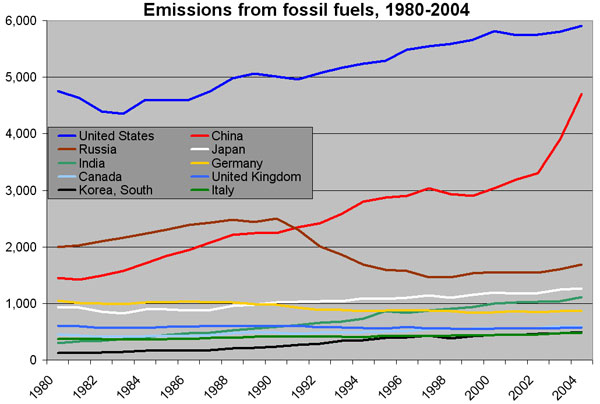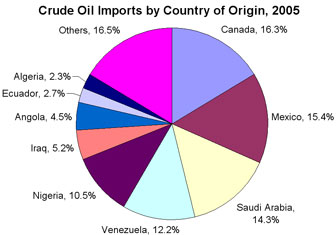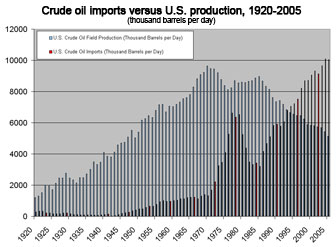The US government has now confirmed that the oil spill in the Gulf of Mexico is the United States’ largest oil spill and perhaps the nation’s worst environmental disaster. While poor government oversight and negligence by oil giant BP certainly contributed to the disaster, the fact that the US is drilling over a mile below the surface in one of its most important marine ecosystems is directly related to US consumption of oil: the highest in the world.
In 2007 the United States consumed 20,680,000 barrels (868,500,000 gallons) of oil every day, or approximately 7.5 billion barrels (or 337.5 billon gallons) of oil during the year.
The federal government says that the oil spill in the Gulf of Mexico has currently released approximately 504,000 to 798,000 barrels of oil into the Gulf based on forty one days of leaking: about 2-4 percent of the United States’ one day consumption.
Given its huge rate of consumption, the US is also the number one importer of oil in the world. In 2007, two thirds (66.19 percent) of the nation’s oil was imported from abroad.
Its desire for oil has also made the US one of the primary importers of oil from Canada’s controversial tar sands. In 2009 eight percent of US oil came from the tar sands, yet a recent report shows that number could jump to 20-36 percent by 2030. The tar sands have become infamous for being one of the world’s largest industrial sources of greenhouse gases.
The world’s biggest oil consumer after the US is China, which in 2007 consumed over 7,578,000 barrels of oil daily: almost one-third (36 percent) of the United States’ oil consumption. Yet China has over four times the population of the United States.
The United States comes in 23rd in per capita oil consumption. Many of the top twenty oil consumers are small countries, usually islands, with tiny affluent populations. But the US is also below Canada, which comes in at 19, in per capita consumption.
Although US politicians have long recognized the nation’s addiction to oil and its impact on both the environment and foreign policy, little has been done in the US to stem the addiction. In fact, for three decades the US has focused on importing more from abroad and drilling more—including off-shore drilling—rather than curbing consumption.
 Fuel efficiency and car weight in the US, 1975-2006. |
The US has a long history—up to the current spill—of giving oil companies and consumers large subsidies on the oil they produce and buy. From 2002-2008 the US handed out 72 billion dollars in subsidies to fossil fuels, during the same time period 29 billion was given to renewable energy, over half of which went to ethanol, which environmentalists say pushes deforestation in the tropics and aggravates food crises worldwide.
In addition, the US went nearly thirty years without raising its efficiency standards for vehicles, which have only been raised incrementally since 2007. In 2012 EU fuel efficiency will hit 47-52 miles per gallon (mpg), while US fuel efficiency is expected to hit 39 mpg four years later.
Few US politicians have called on citizens to reduce consumption even in light of the current environmental catastrophe. Most blame BP or the Obama Administration, depending on their political affiliation, but not consumption habits.


Related articles
Who’s to blame for the oil spill?

(05/04/2010) America, we deserve the oil spill now threatening the beautiful coast of Louisiana. This disaster is not natural, like the earthquake that devastated Haiti or tsunami that swept Southeast Asia in 2006; this disaster is man-made, American-made in fact, pure and simple. So, while in the upcoming weeks and months—if things go poorly—we may decry the oil-drenched wildlife, the economic loss for the region, the spoiled beeches, the wrecked ecosystems, the massive disaster that could take decades if not longer to recover from, we, as Americans, cannot think smugly that we are somehow innocent of what has happened. You play with fire: you will get burned. You drill for oil 1,500 meters below the surface of the ocean, you open up oil holes across the surface of your supposedly-beloved landscape, sooner or later there will be a spill, and sometimes that spill will be catastrophic.
Anatomy of an Oil Disaster: Heckuva Job, Kenny!
(05/06/2010) Who is responsible for the great environmental disaster arising from the oil spill in the Gulf of Mexico? As the country reels from the sheer magnitude of the accident, the media has rightly pointed the finger at BP. Yet, not nearly enough attention has been paid to the role of Ken Salazar and his derelict Department of Interior, a government entity which, in theory, regulates offshore oil drilling.
BP’s Oily Political Connections: from the Bush to Obama Era
(05/04/2010) Judging from the oily history of the last ten years, reining in BP could prove politically daunting. A company with incredible economic might, BP has enjoyed privileged access to the inner rungs of Washington power. Only by ridding the political system of insider money can we hope to avert future oil disasters like the devastating spill which hit the Gulf of Mexico last week.

